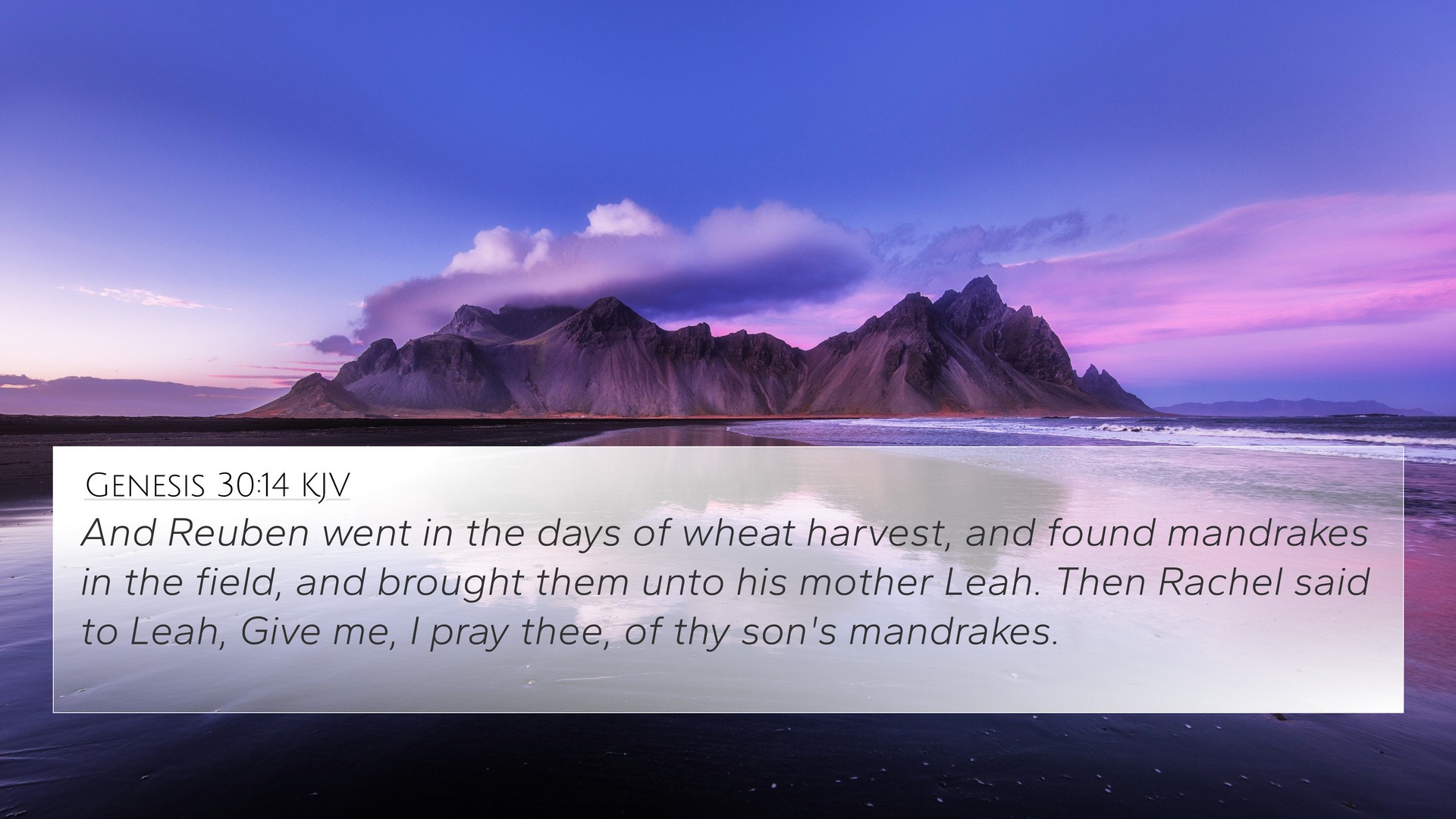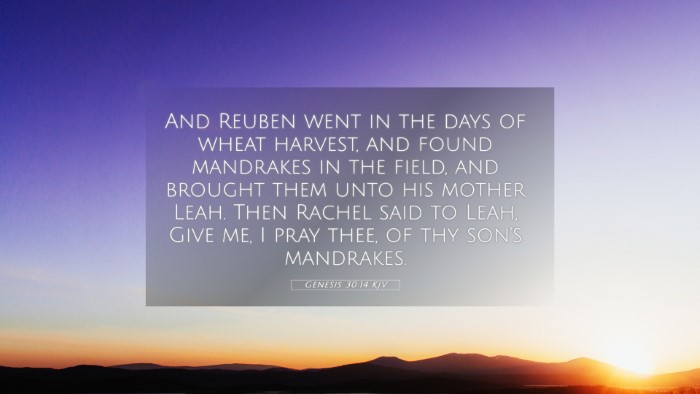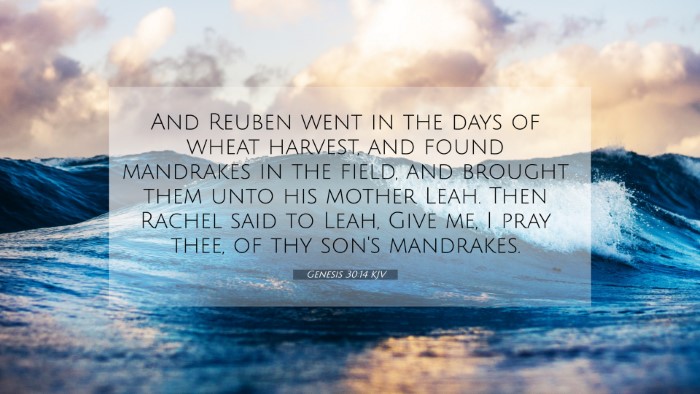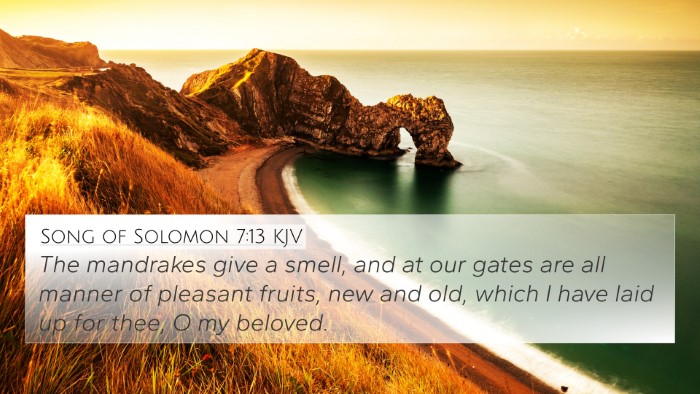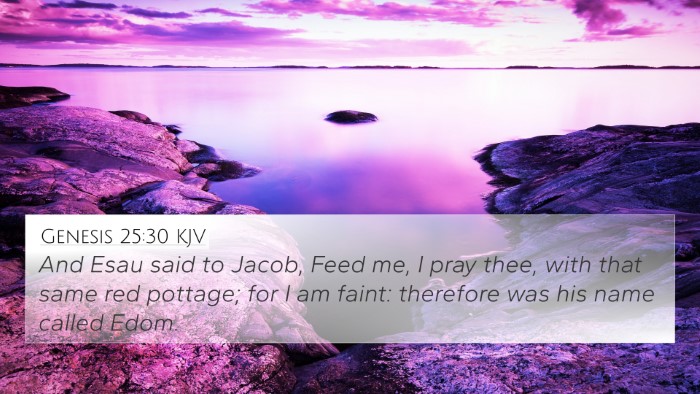Understanding Genesis 30:14
Genesis 30:14 (KJV): "And Reuben went in the days of wheat harvest and found mandrakes in the field, and brought them unto his mother Leah: then Rachel said to Leah, Give me, I pray thee, of thy son's mandrakes."
Verse Context and Summary
This verse takes place in a narrative context where Leah and Rachel, the wives of Jacob, are involved in a rivalry over childbearing and the favor of their husband Jacob. The mandrakes, associated with fertility, symbolize the desire for children and the ongoing struggle between the two sisters.
Commentary Insights
Matthew Henry's Commentary
Henry highlights the significance of the mandrakes and their role within the culture of that time, where they were believed to have fertility-enhancing effects. Reuben's act of bringing mandrakes to Leah reflects the themes of family dynamics and competition.
Albert Barnes' Notes
Barnes expounds on the meaning of the mandrakes in the context of ancient medicine and superstition. He notes that this event is illustrative of Rachel's desperation to conceive and her resort to unconventional means for obtaining what she desires - a child. He interprets the verse as a reflection of the struggles and complexities inherent in familial relationships.
Adam Clarke's Commentary
Clarke elaborates on the cultural implications of the mandrakes and suggests that they were highly valued in ancient Israel. He emphasizes that Rachel's request signifies her deep yearning for offspring, and the fact that she desires the mandrakes of Reuben demonstrates the intense rivalry and sorrow between the sisters.
Thematic Connections
Genesis 30:14 reveals intricate themes that resonate throughout the Scripture. Below are some Bible verse parallels and connections with this verse:
- Genesis 29:31-35: Discusses Leah's struggle with her fertility and how she bears children for Jacob.
- Genesis 30:1: Rachel's jealousy towards Leah for bearing children and her plea for Jacob to give her children.
- 1 Samuel 1:5-6: The story of Hannah, who also faced infertility and was mocked by her rival, paralleling Rachel's plight.
- Genesis 35:16-18: The birth of Benjamin and Rachel's death; highlights the tragic outcome of her desperation.
- Psalm 127:3: Affirms children as a heritage from the Lord, reinforcing the cultural significance attached to offspring.
- Galatians 4:22-31: Compares the two sons of two women (Hagar and Sarah) to depict the covenant between the flesh and the spirit, reflecting rivalry.
- Matthew 19:4-6: Jesus references creation and the union of man and woman, reflecting God's intent for family dynamics.
Cross-Referencing Related Themes
The act of seeking mandrakes by Rachel can be paralleled with other Biblical narratives that explore themes of struggle, desperation, and the significance of offspring. These connections offer deeper insights into the spiritual and relational implications of such narratives:
- Tools for Bible Cross-Referencing: Utilize a Bible concordance to locate themes relating to fertility.
- Bible Cross-Reference Guide: Helps in understanding the dynamics of sibling relationships across various Scriptures.
- Cross-Reference Bible Study: Engage in reflections from both the Old Testament and New Testament.
- How to Use Bible Cross-References: Investigate underlying themes and moral lessons depicted through paired Scriptures.
Exploring the User Intent
For those seeking deeper understanding of Genesis 30:14, discovering related verses can enrich the study:
- What verses are related to Genesis 30:14? Investigate Genesis chapters 29 and 35 for further context of Reuben's actions.
- Find cross-references for Genesis 30:14: Explore the narrative of Hannah in 1 Samuel for a parallel story of desperation.
- Similarities between Genesis 30:14 and Genesis 29: Reveal the ongoing struggle for love and acceptance within the family unit.
- Bible verses that support the themes in Genesis 30:14: Include Psalm 127 which emphasizes the blessing of children.
Conclusion
Genesis 30:14 serves as a poignant reminder of the depths of familial rivalry, the cultural importance of children, and the lengths individuals will go to attain fulfillment in their lives. The cross-references drawn from this verse facilitate a richer, more nuanced understanding of Scripture as a cohesive narrative where various themes interlink across the Bible.
